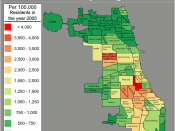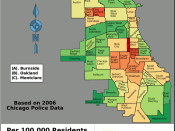When it comes to reporting crime the media is confronted daily with decisions on how to present their stories, what to write and what not to write, of choosing to report the bad news, misquoting those they interview, and sensationalizing. People come to believe what they read and, in a sense, is irrelevant whether what they believe is true or not, for their ideas affect how they live their lives. They develop an exaggerated and distorted fear of crime from the media. For much of what we learn about the world comes from television, newspapers, magazines and so on. Crime is more than simply reported by the news; it is constructed, manipulated and distorted as well.
Crime, deviance, delinquency and other social problems have always been a staple of newspaper accounts, television news shows and crime dramas. Knowledge of these events is secondhand, filtered through the media graphically and textually, thus appearing immediate, shocking, entertaining and informative.
In today's society the media has replaced firsthand experience as our source of information, opinion, and news about the world. The pervasiveness and assumed facticity of the news is rarely questioned, and sometimes it's a jolt to realize that memories of events can be created (Russell, 27).
The media can make it seem as if we are at the scene of the crime down the street or seeing events half a world away as in the Persian Gulf. The media can also make it seem possible to pass judgement on complicated issues arising such as, in the O.J. Simpson trail. They help create opinions on events never to be experienced firsthand on the basis of the evidence presented by people that we will never meet. This leads to viewers and readers accepting the secondhand nature of the news. Only when a source is...



Nice
Not bad a lot of information... ton of references really nice... thanks for the information..
0 out of 0 people found this comment useful.